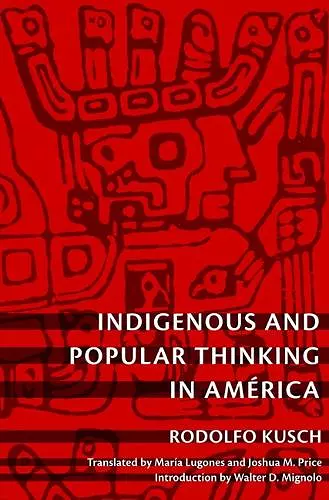Indigenous and Popular Thinking in América
Rodolfo Kusch author Joshua M Price translator María Lugones translator
Format:Hardback
Publisher:Duke University Press
Published:7th Apr '10
Currently unavailable, our supplier has not provided us a restock date

A seminal philosophic work that endeavors to identify and recover indigenous styles of thinking--by an Argentine philosopher still almost unknown in the United States.
An influential work originally published in Mexico in 1970; the Argentine philosopher Rodolfo Kusch seeks to identify and recover indigenous and popular ways of thinking devalued since colonization.Originally published in Mexico in 1970, Indigenous and Popular Thinking in América is the first book by the Argentine philosopher Rodolfo Kusch (1922–79) to be translated into English. At its core is a binary created by colonization and the devaluation of indigenous practices and cosmologies: an opposition between the technologies and rationalities of European modernity and the popular mode of thinking, which is deeply tied to Indian ways of knowing and being. Arguing that this binary cuts through América, Kusch seeks to identify and recover the indigenous and popular way of thinking, which he contends is dismissed or misunderstood by many urban Argentines, including leftist intellectuals.
Indigenous and Popular Thinking in América is a record of Kusch's attempt to immerse himself in the indigenous ways of knowing and being. At first glance, his methodology resembles ethnography. He speaks with and observes indigenous people and mestizos in Peru, Bolivia, and Argentina. He questions them about their agricultural practices and economic decisions; he observes rituals; he asks women in the market the meaning of indigenous talismans; he interviews shamans; he describes the spatial arrangement and the contents of shrines, altars, and temples; and he reproduces diagrams of archaeological sites, which he then interprets at length. Yet he does not present a "them" to a putative "us." Instead, he offers an inroad to a way of thinking and being that does not follow the logic or fit into the categories of Western social science and philosophy. In his introduction, Walter D. Mignolo discusses Kusch's work and its relation to that of other twentieth-century intellectuals, Argentine history, and contemporary scholarship on the subaltern and decoloniality.
“[I]ndispensable reading for all scholars and students of the question of cultural encounters, the construction and deployment of the other, the struggle and constitution of different and competing epistemologies, and the setting up of the coloniality of power/knowledge. . . . [E]xtensively
researched and carefully thought out . . . make[s] an enormous contribution
to our knowledge and understanding of the Andean post-colonial world and
the processes of subject formation that ensued from the conquest to this day.”
- Sara Castro-Klarén, MLN
“This translation of one of Rodolfo Kusch’s most important works marks a significant step in the energetic conversation that has emerged over the last decade among postcolonial, indigenous, and Latin American studies. A translation of Kusch’s work has been sorely needed, both to complement the writing of scholars including Walter D. Mignolo, who have drawn from and discussed Kusch, and to stand alongside translations of books by other Latin American and Caribbean intellectuals including Édouard Glissant, Fernando Ortiz, and Enrique Dussel.”—Michael Hames-García, author of Fugitive Thought: Prison Movements, Race, and the Meaning of Justice
“Indigenous and Popular Thinking in América is a superior work by Rodolfo Kusch, and María Lugones’s and Joshua M. Price’s superb translation is a major contribution to English-language philosophy. Kusch’s book operates on many levels, as a post-Heideggerian phenomenology of culture, an existential analysis, and a sustained reflection on Otherness.”—Mario Sáenz, author of The Identity of Liberation in Latin American Thought
“[I]ndispensable reading for all scholars and students of the question of cultural encounters, the construction and deployment of the other, the struggle and constitution of different and competing epistemologies, and the setting up of the coloniality of power/knowledge. . . . [E]xtensively researched and carefully thought out . . . make[s] an enormous contribution to our knowledge and understanding of the Andean post-colonial world and the processes of subject formation that ensued from the conquest to this day.” -- Sara Castro-Klarén * MLN *
ISBN: 9780822346296
Dimensions: unknown
Weight: 549g
296 pages